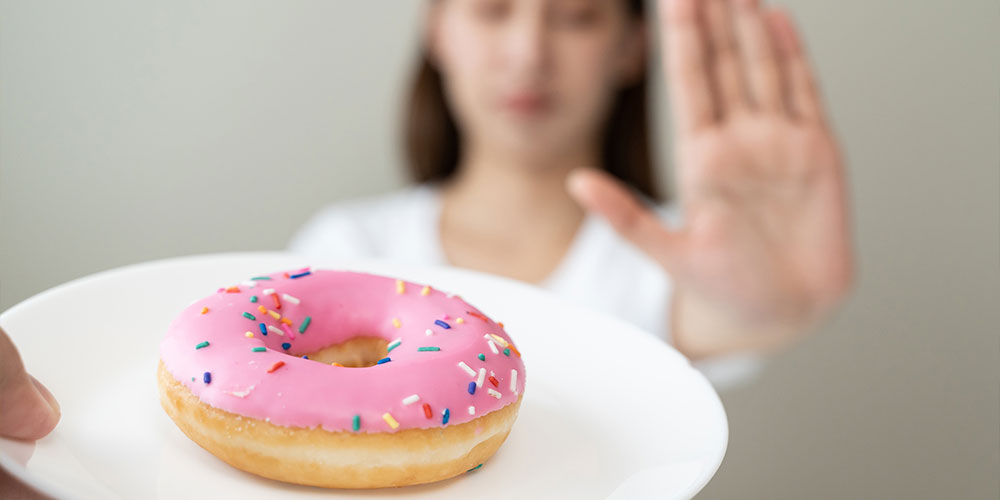By Emily Gause, MA, RDN, LDN
Top Five Reasons for Food Noise
1. YOU ARE HUNGRY: Being in a state of caloric deprivation (being overly hungry and food-deprived) can lead to a heightened focus on food, particularly high-calorie foods. Food is a biological need, and our bodies know that we would starve without regular and consistent access to adequate food. Through deprivation, thoughts tend to become much more insistent and urgent about getting food QUICKLY. Food noise is our body’s way of keeping us alive! Certain medical conditions such as insulin resistance in polycystic ovarian syndrome (PCOS), Type 2 diabetes, or others may also amplify hunger and cravings due to blood sugar abnormalities, maximizing food noise. Registered Dietitian Julie Duffy Dillon notes, “We have pathologized food noise when it is a normal and important reaction to something that is not ok in our environment: our body and mind are worried about not having enough food.”
TURNING DOWN THE VOLUME: The antidote is eating enough! Most people need at least three meals and two to three snacks daily, including a combination of protein, carbohydrates, and fat. Eating consistently and adequately can significantly reduce obsessive food thoughts and improve mood. For those with insulin resistance, diabetes, or other biological factors that can amplify hunger and cravings, regular meals and snacks are just as vital! Enjoy carbohydrates at every meal and snack, pairing them with protein and fat to help take fullness further.
2. YOU ARE CURRENTLY DIETING OR HAVE A HISTORY OF DIETING. The research is clear: Dieting creates a type of psychological deprivation. You may be eating ENOUGH (although most diets significantly underestimate how much energy a person needs), but restricting certain foods or food groups can trigger hyperfocus on these foods. Limiting certain foods can lead to excessive thoughts about forbidden foods, amplifying cravings.
TURNING DOWN THE VOLUME: Stop dieting! Dieting is linked to weight gain and cycling (losing and regaining weight with each consecutive diet) and a greater risk of insulin resistance, elevated blood pressure, and high cholesterol, among others. Moving away from dieting can be scary, particularly if you’ve dieted for most of your life. Intuitive
“What percentage of your thoughts revolve around food?” My client’s expression shifted from contemplation to sadness. “Nearly all of my thoughts revolve around food,” she responded.
A significant percentage of food-related thoughts can indicate a complicated relationship with food. The term “food noise” hints at the distress these thoughts can trigger. While there is no standard definition of “food noise,” the term is typically associated with obsessive thoughts about food, compulsions to eat, or feeling out of control around food.
Mainstream efforts to reduce food noise have included recommending appetite-suppressing medications, limiting access to certain foods, dieting, or improving stress levels and sleep hygiene. However, many of these recommendations AMPLIFY food noise over time! Below are five major reasons for food noise and how to dial down the volume.
Eating is a non-diet alternative that provides a framework for connecting to internal cues (hunger, fullness, satisfaction) and offering yourself permission to eat the foods you truly enjoy without focusing on weight. Permission is the antidote to deprivation! Permitting yourself to enjoy ALL foods mindfully and without restriction will reduce food noise while helping you connect with your body’s authentic needs and preferences.
3. YOU HAVE A HISTORY OF FOOD INSECURITY. Food scarcity leads to hyperfocus on food due to the necessity for adequacy. Experiencing past (or present!) food insecurity can lead to food hoarding, refusing to throw out old food, or thoughts dominated by the next meal. Dieting can worsen this hyperfocus because it mimics food insecurity through “intentional deprivation,” which may trigger anxiety and amplify food noise.
TURNING DOWN THE VOLUME: If food is now consistently available, work on noticing and challenging thoughts and fears of food running out. Avoid restrictive diets — they mimic deprivation and keep food noise volume high. Eat enough and avoid getting overly hungry as you work on teaching your body that there will always be plenty. Because food is vital to survival, going through periods of food scarcity is a form of trauma, the effects of which can linger long after food is consistently available. Consider working with a therapist and Registered Dietitian for additional support.
4. YOU FEEL UNSATISFIED AFTER MEALS. Have you ever finished a meal and felt like it didn’t quite “hit the spot?” This may have been followed by “The Hunt” — looking for another food to satisfy that feeling, often at the expense of being OVERLY full afterward. When we eat meals that are not what we truly want, craving something that will hit the spot may follow. Food noise intensifies, and the search for ways to satisfy those cravings continues.
TURNING DOWN THE VOLUME: Remember that permission to eat what you truly want is one of the primary antidotes to food noise. Instead of trying to satisfy cravings with alternatives (diet desserts, fruit instead of ice cream, PB powder instead of peanut butter, etc.), permit yourself to have what you want mindfully! Consider which foods are flavorful, enjoyable, and satisfying. Contemplate which textures, temperatures, flavors, or colors sound appetizing and honor those preferences. Research shows that individuals who feel satisfied after meals eat less overall than those who do not. Satisfaction from meals is a fundamental need, so have some fun experimenting with your favorite foods!
5. YOU STRUGGLE WITH AN EATING DISORDER OR DISORDERED EATING PATTERNS. At least 9% of Americans suffer from an eating disorder. Eating disorders are debilitating mental illnesses that affect people across the spectrum of weight, gender, race, and income. Signs of an eating disorder include guilt after eating, compulsive exercise, preoccupation with food and body image, and emotional eating, among others. The food noise associated with eating disorders and disordered eating patterns can be debilitating.
TURNING DOWN THE VOLUME: Reach out for help! Find a therapist and Registered Dietitian specializing in eating disorder recovery to help support a peaceful relationship with food and your body. The dietitians at Memphis Nutrition Group specialize in eating disorder recovery and would love to work with you!
A Note on GLP-1s
The term “food noise” is often heard in conjunction with GLP-1s, a class of medications designed to help lower blood sugar in individuals with Type 2 diabetes. Ragen Chastain, a diet industry critic and commentator, notes that the pairing of food noise and weight loss drugs is intentional: “[Food noise] seems to be used to convince the target market for these drugs…that the resulting hunger and disrupted relationship with food [caused by dieting] is something that can be solved by…wait for it…the weight loss industry.” Side effects of this medication class include slowed digestion and reduced appetite, which has been capitalized on and sold to thousands of individuals desiring weight loss — at dosages far higher than those prescribed for lowering blood sugar. Taking a GLP-1 (Ozempic, Wegovy, Mounjaro, etc.) may reduce food noise due to its effects on the brain and stomach by promoting early satiety, but it is associated with many other potential side effects. Additionally, long-term studies (beyond two years) on using this drug for weight loss are lacking. The available research has consistently shown that stopping this medication results in an almost immediate regain of lost weight. Even those taking a GLP-1 consistently saw weight that began trending back up after the two-year mark. More than likely, any GLP-1-related reduction in food noise will dial back up as soon as the medication is stopped.
Emily Gause, MA, RDN, LDN is a Nutrition Therapist at Memphis Nutrition Group, a nutrition and lifestyle counseling practice offering in-person and virtual nutrition therapy specializing in a non-diet, weight-neutral approach. The Registered Dietitians at Memphis Nutrition Group help individuals reconnect with their bodies, find confidence and clarity in their everyday choices. Contact Memphis Nutrition Group at 901.343.6146 or visit MemphisNutritionGroup.com for more information. You can also follow Memphis Nutrition Group on Instagram and Facebook.







